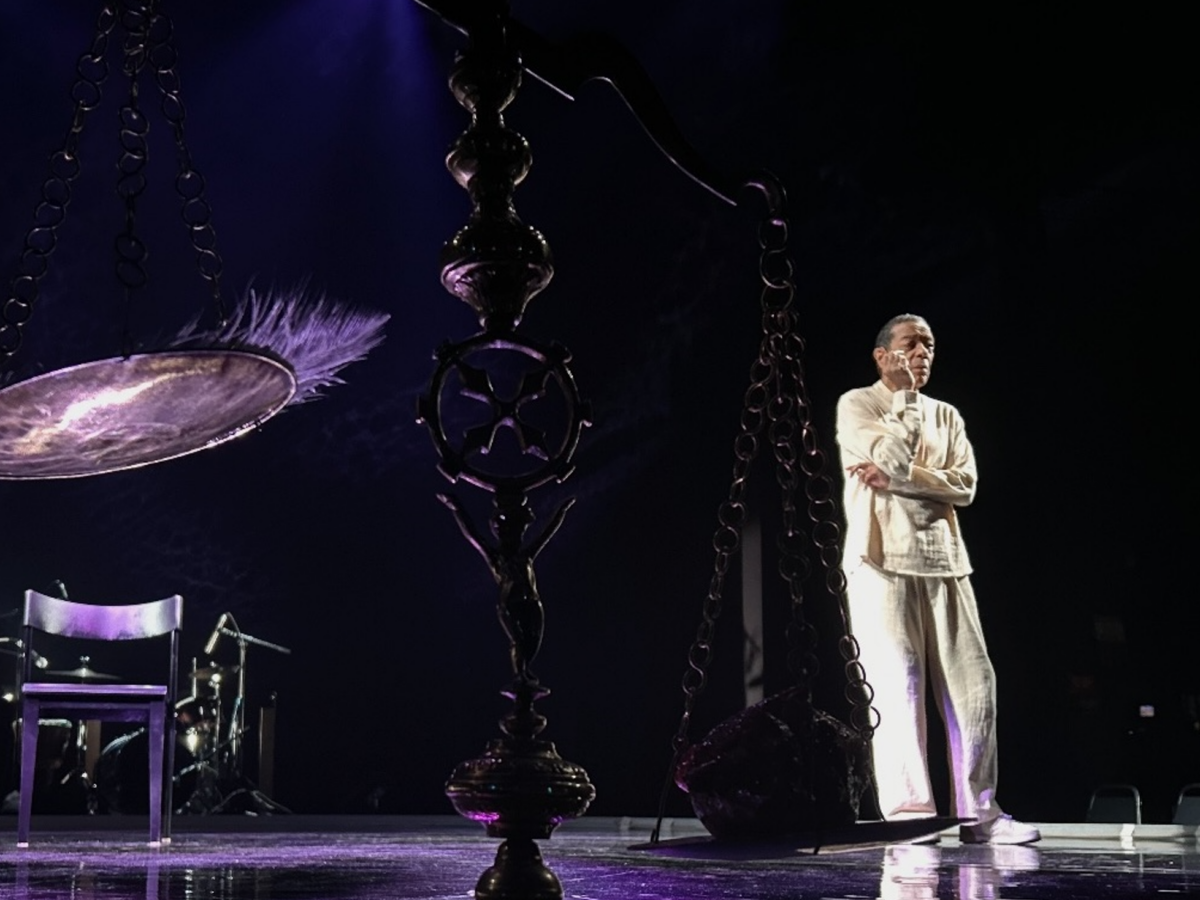Fil-Am playwright tells story of FBI spy in ‘The Duat’

Rehearsals for Filipino American Roger Mason’s play “The Duat,” which explores identity, loss and redemption.
PHILADELPHIA — Spoken-word, live North African drumming and scintillating choreography will come together to tell a story of identity, loss and redemption in Filipino American Roger Mason’s “The Duat.”
The play will have its world premiere from Philadelphia Theatre Company this June. Dramaturgy is by Fil-Am Gaven Trinidad.
The solo show, which will be performed by Frank X, is described as a psychological portrait of FBI counterintelligence officer Cornelius Johnson, who helped dismantle the Black Power Movement in the 1960s and must now battle for his very soul in the duat—the Pan African Egyptian afterlife.
Mason, who self-describes as “black, Irish, Filipino, gender-queer, plus-sized and fabulous!” and uses they/them pronouns, has been busy this first half of the year.
Two of their works were just recently staged: “The Pride of Lions” by Theatre Rhinoceros in San Francisco, directed by Fil-Am Ely Orquiza, and “Lavender Men” in Chicago by About Face Theatre.
Judgement
For “The Duat,” the fictional character of Cornelius Johnson was created “based on real people who lived in America in the 1960s and 1970s. They were everyday citizens, usually of African American descent, who helped the FBI infiltrate various organizations within the Black Power Movement,” says Mason.
“Their goal was to disrupt efforts by these groups to educate, unify and empower their communities to revolt against the oppression of institutional racism in the United States.”
Mason has always been fascinated by ancient Egypt. “The Egyptian afterlife is a foundational myth of the human experience which still influences our notions of death and spirituality today. Ideals surrounding morality, judgment based upon rightful action, and responsibility to the cosmos remain central pillars of contemporary religious belief systems.
“Now, why is our play’s hero in the Egyptian afterlife? Well, it is a bit of ironic humor on my part. Cornelius betrays Black people during his life by ratting them out to the FBI, so I felt that there was no place more fitting for him to land after death than in an African afterlife. How will he be judged after wronging his people?”
Community and love
Mason says, “I’ve dedicated the last two decades of my life to writing historical fantasias because I care about the future. My theater works are survival guides written to tomorrow, showing how we, in the past, used unity, community and love to conquer bias, bigotry and hate.”
The passion for examining history was partly inspired by a childhood educator. “When I was in 10th grade, my history teacher threw out our state-sanctioned history books and gave us Howard Zinn’s A People’s History of the United States. It presented an alternative view of America, one rooted in the wants and needs of its citizens and immigrants, not the power structures that govern it.”
That book had a profound impact on Mason’s understanding of history. “It showed me that political power often silences the voices of those whose ideas are threatening to the maintenance of their control.”
Compel to action
“Looking at history, we can see the ways that our ancestors have survived silencing, hatred, and discrimination. Their stories guide us and give us hope for our own survival. They assure us that someone has come before, made it through the trials of oppression, and lived to tell the tale. In so doing, they provide us with the resilience to fight on.”
According to Mason, “theater possesses the unique power to embody such road maps, to dig into the past in real time and provide palpable survival guides for its audiences to create brighter, more inclusive futures than their present realities.”
“The effect of a live performance, especially one of a historical nature, is staggering. It is like a time warp and a prayer for the future all in one,” he says. “Suddenly, history is alive for you in the present and its lessons compel you to action, to transform how you think, interact with others and perceive the world around you.”
“The Duat” runs June 7-23 at Suzanne Roberts Theatre, 480 South Broad St., Philadelphia. Walter Ang is the author of Barangay to Broadway: Filipino American Theater. Available at Amazon, Bookshop and other online booksellers.

